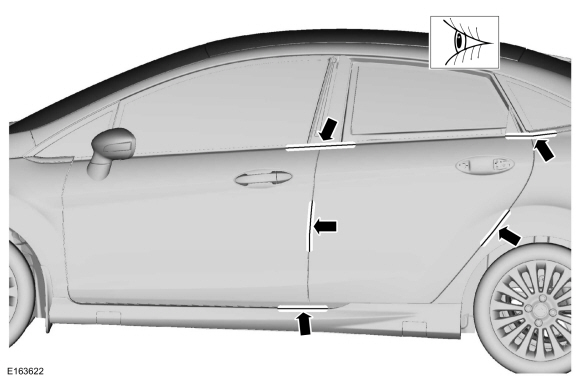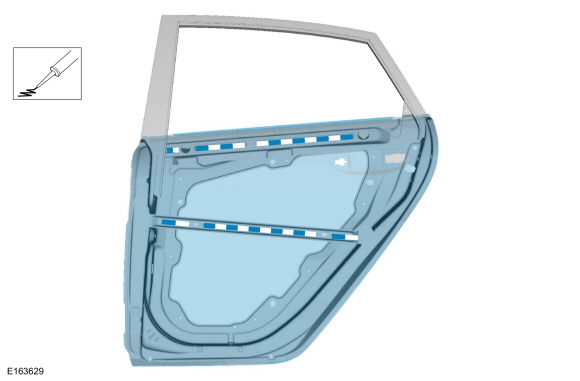Ford Fiesta: Side Panel Sheet Metal Repairs / Rear Door Skin Panel. Removal and Installation
Special Tool(s) /
General Equipment
| Grinder |
| Hot Air Gun |
| Knife |
| MIG/MAG Welding Equipment |
| Locking Pliers |
Materials
| Name |
Specification |
Metal Bonding Adhesive
TA-1, TA-1-B, 3M™ 08115, LORD Fusor® 108B, Henkel Teroson EP 5055 |
-
|
Seam Sealer
TA-2-B, 3M™ 08308, LORD Fusor® 803DTM |
-
|
Flexible Foam Repair
3M™ 08463, LORD Fusor® 121 |
-
|
Removal
NOTE:
LH side shown, RH side similar.
-
 WARNING:
Before beginning any service procedure in this
section, refer to Safety Warnings in section 100-00 General Information.
Failure to follow this instruction may result in serious personal
injury.
WARNING:
Before beginning any service procedure in this
section, refer to Safety Warnings in section 100-00 General Information.
Failure to follow this instruction may result in serious personal
injury.
Refer to: Body Repair Health and Safety and General Precautions (100-00 General Information, Description and Operation).
-
Inspect the upper and lower door hinges for wear or damage, install new or rebuild as necessary.
-
Remove the rear door window glass.
Refer to: Rear Window Glass - 4-Door (501-11 Glass, Frames and Mechanisms, Removal and Installation).
-
Remove the rear door.
Refer to: Rear Door (501-03 Body Closures, Removal and Installation).
-
Remove the exterior rear door handle.
Refer to: Exterior Rear Door Handle (501-14 Handles, Locks, Latches and Entry Systems, Removal and Installation).
-
Remove the rear door upper moulding.
Use the General Equipment: Hot Air Gun
-
Carefully cut the tack welds.
Use the General Equipment: Grinder
-
Carefully cut and remove the outer door panel only.
Use the General Equipment: Grinder
-
Break the adhesive bond and remove the remaining portion of the rear door panel hem flange.
Use the General Equipment: Knife
Use the General Equipment: Hot Air Gun
Installation
-
Remove all adhesive and foreign materials from the door shell to outer door panel mating surfaces.
-
Remove the e-coat from the mating surface.
-
Apply adhesive to the door shell mating surface.
Material: Metal Bonding Adhesive
/ TA-1, TA-1-B, 3M™ 08115, LORD Fusor® 108B, Henkel Teroson EP 5055
-
Install the outer door panel and partially crimp the flange.
Use the General Equipment: Locking Pliers
-
Temporarily install the door on the vehicle.
-
Check for proper alignment and adjust as necessary.
-
Carefully open the door and tack weld to lock panel in place.
Use the General Equipment: MIG/MAG Welding Equipment
-
Remove the door from the vehicle.
-
NOTE:
Smooth residual adhesive squeeze-out in to seam to act as a sealer.
Complete the hemming process.
-
Sand and clean the door flange area.
-
Apply a Ford approved primer to the flange area.
-
Apply seam sealer as indicated.
Material: Seam Sealer
/ TA-2-B, 3M™ 08308, LORD Fusor® 803DTM
-
Refinish the hem area using a Ford approved paint system.
-
Install the door.
-
Refinish the door exterior using a Ford approved paint system.
-
Install NVH pads as indicated (obtain locally).
-
Apply NVH foam as indicated.
Material: Flexible Foam Repair
/ 3M™ 08463, LORD Fusor® 121
-
Install the exterior rear door handle.
Refer to: Exterior Rear Door Handle (501-14 Handles, Locks, Latches and Entry Systems, Removal and Installation).
-
Install the rear door window glass.
Refer to: Rear Door Window Glass (501-11 Glass, Frames and Mechanisms, Removal and Installation).
-
Install the rear door upper moulding.
-
Restore corrosion protection.
Refer to: Corrosion Prevention (501-25 Body Repairs - General Information, General Procedures).
-
Align the door.
Refer to: Rear Door Alignment (501-03 Body Closures, General Procedures).
Other information:
Special Tool(s) /
General Equipment
Resistance Spotwelding Equipment
Hot Air Gun
Air Body Saw
MIG/MAG Welding Equipment
Spot Weld Drill Bit
Locking Pliers
Folding Rule
Materials
Name
Specification
Metal Bonding AdhesiveTA-1, TA-1-B, 3M™ 08115, LORD Fusor® 108B, Henkel Teroson EP 5055
-
Removal
..
Electronic Engine Controls - LH Side of Engine
Item
Description
1
MAP sensor
2
VCT oil control solenoid
3
CMP sensor - LH
4
Crankcase Pressure sensor
5
PCM
6
MAF sensor
7
Turbocharger boost pressure and charge air temperature sensor
8
Rear KS
9
Front..
 WARNING:
Before beginning any service procedure in this
section, refer to Safety Warnings in section 100-00 General Information.
Failure to follow this instruction may result in serious personal
injury.
WARNING:
Before beginning any service procedure in this
section, refer to Safety Warnings in section 100-00 General Information.
Failure to follow this instruction may result in serious personal
injury.




























